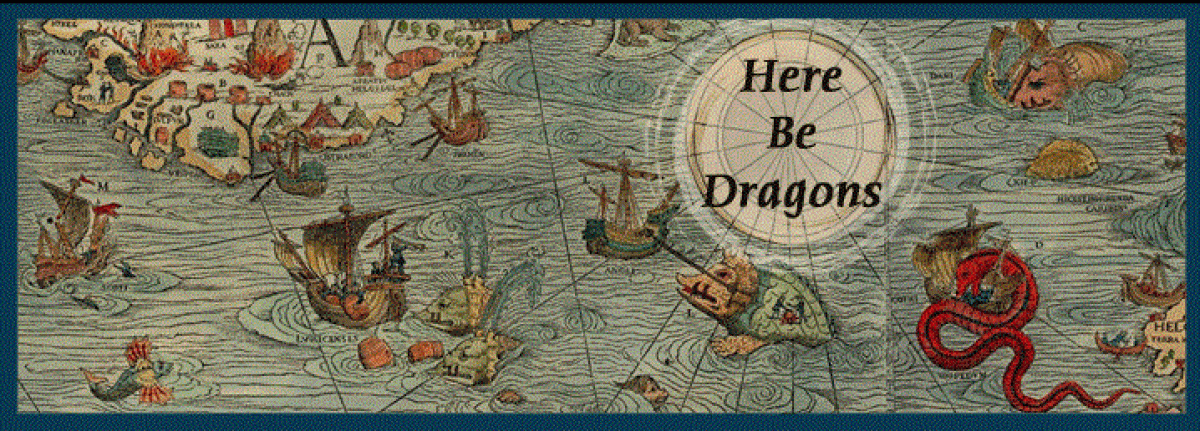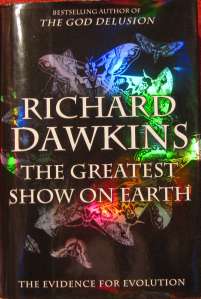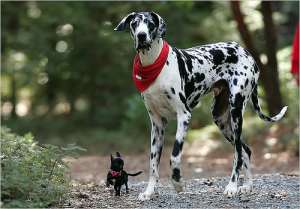Have any of you been watching the re-boot of Cosmos? I ask, because not many people I know are, and those who are watching have given it a lukewarm response. I have to admit, as much as I admire Neil de Grass Tyson, there is something off about this show. It feels dumbed down and sadly seems to miss many of the finer points Sagan made in the original. I’m going to give it a couple of more episodes before I completely condemn it. I just bought a copy of the original series, so look for an upcoming blog in which I compare the two.
But, I have to admit I am happy to see science education being broadcast on network television. As a country we have to admit we are not as well versed on science as we should be. Late night infomercials wouldn’t be so lucrative if we were.
So to celebrate science education I thought I would bring out an old review I did on Richard Dawkins’ bestseller, The Greatest Show on Earth, the evidence for evolution, for those who have yet to tackle the science behind our origins. This post is my science re-boot.
One advantage to college is that it exposes you to subjects that you otherwise may not touch. For me this is science. In high school I was encouraged to take agriculture as my science requirement because of my poor math skills. Since I lived on my grandparent’s farm during the summer months I laughed that I could take a class doing things I did on a daily basis. Needless to say I aced this “science” class, but my knowledge of general science was woefully lacking. During my early adult years I stayed away from science thinking I was not smart enough to get it. After taking a biology class three years ago, I found not only am I smart enough to get it, I love it and decided to learn all I can. Most of my education has come from reading science books though I have taken three science classes since biology.
Early this summer I decided to learn more about evolution. Sure I had the basics down, but really not enough to hold a good debate with the creationist in my family. Like most people what I “knew” came from what I had heard, not from what I read. Obviously one way to learn more about evolution was to read Darwin himself, but this turned out to be a very dry and boring read I am sorry to say. I looked for a modern guide to evolution; after all we have learned so much since Darwin, surely there had to be someone out there who has written a type of “update” in a engaging and entertaining way. To my surprise this turned out to be Richard Dawkins. Dawkins’ The Greatest Show on Earth, the Evidence for Evolution is a book that I feel Darwin himself would have written if he had all the facts and evidence we have now.
Like many readers I only knew Dawkins from The God Delusion and his famed Spaghetti Monster. I didn’t know Dawkins is a biologist and a rather knowledgeable and engaging one at that. His latest book The Greatest Show on Earth, the evidence for evolution taught me almost everything I need to know about evolution; why and how it works, but more importantly (at least in my mind) it got me asking questions. This is how I gauge if I am truly learning anything, when I ask follow up questions.
The book reads like a course in evolution. Dawkins starts with examples of evolution and mutation by “artificial means”. What we all take for granted but not understand is that artificial means is a type of evolution humans have been engineering since the birth of civilization. Hunter gatherers tribes would not have devolved into agrarian societies without it.
Over thousands of years man has taken the wolf from village scavengers to the many breeds of dogs we see today. A scientist in Russia did the same with foxes in the 1950’s and within just a few short generations had tame foxes. These foxes began to look and act like dogs, from the floppy ears to loyal behavior. Dawkins points to plant breeding; from our early ancestor’s ability to change /adapt wild plants to the grains and cabbages we have today, to the award winning roses we all know and love. Dawkins starts here so the reader becomes comfortable with the idea of evolution and gene mutation.
The book then moves on to how genes mutate and how DNA works. Those who may not have been exposed to these subjects beforehand can take heart that Dawkins explains this in layman’s terms. Those who have a firm grasp on the subjects can enjoy Dawkins examples of rapid evolution. There is a great story of a biologist who does an experiment on fish to determine how long it would take for them to change their spot patterns when introduced to predators. I won’t spoil it for you, but will say I have some good ammunition f the next round of discussions with my creationist minded aunt.
I will admit the middle of the book dragged a little for me. Here Dawkins goes through the nine months of gestation. Even Dawkins admits this is a little digression, but he did have a point to make. I think he could have made the point in less time. This is my only negative thought on the book; at times Dawkins eloquently explains something but then goes on to spend another page or two explaining what he just said. Either Dawkins does not have confidence in his ability to get a point across or he does not have confidence his reader will fully understand some key points. I found myself skipping some parts because of this.
Over all I would highly recommend this book to anyone who wants a better understanding of evolution or science in general. Trust me, this is no dry science book. Dawkins biting English humor emerges throughout the book. Laughter can sometimes be a great teacher.
I think we all should have a good grasp on science if only to make us better consumers. Many books and late night infomercials rely on our lack of science knowledge in order to sell us cheesy ideas or products. Dawkins may not stop you from purchasing a self-watering glass globe that magically knows when your plants are dry, but I bet you never look at a dog or plant the same way again.
If you have a favorite science book be sure to leave a comment. I am always on the lookout for a good science read.




Well done, Sari!
I’ve read most of Dawkins’ books, and among his titles The Greatest Show is by far his best, though I would also recommend The Selfish Gene, even amidst the current controversy over the topic.
As you say, Dawkins is the foremost name in evolutionary biology writing, in my mind, he’s the only name. There are others who do well, P.Z. Meyers for instance, but for anyone looking to learn the larger concepts and how they interrelate, Dawkins is the way to go.
For a broader scientific edification, I strongly recommend anything written by Carl Sagan, as I know you do too. Physicist Brian Greene is also quite good.
You’ve struck a topic I could talk about for hours here. 🙂
LikeLike
I have the Selfish Gene on my shelf.
I just bought Sagan’s Cosmos. Can’t believe I missed it when I was looking for science books. I’ve read two of Greene’s books.Love his work too.
LikeLike
Great review! I’ve been watching Cosmos… So far I haven’t found out anything new, I just presume it’s more for the general public. It is visually beautiful though.
As for favourite science books- there are simply too many! Richard Leakey & Roger Lewin’s Sixth Extinction is great!
LikeLike
Thanks for stopping by Kadri. Funny I have a book on my shelf waiting to be read titled The Sixth extinction, but it by Elizabeth Kolber. I agree Cosmos is for the general public, but it lacks the emotional punch of Sagan’s original. I miss Sagan.
LikeLike
I was looking at Kolber’s Sixth Extinction myself, on recommendation. I wonder if I was looking at the right book.
LikeLike
I’ve been enjoying the new Cosmos series. I guess I expected it to be rather basic because of the low level of scientific literacy in the US – I think the people involved with the program really want to meet people where they’re at. So I see it as not so much a show for science geeks as a means of recruiting new science geeks.
I haven’t yet read The Greatest Show on Earth (though I’ve read and benefitted from The Selfish Gene), but I like Jerry Coyne’s book Why Evolution is True. He builds a strong case in a very readable way. It’s the sort of introduction I wish I’d had as a student… that and Carl Sagan’s last book, The Demon-Haunted World: Science as a Candle in the Dark, which is a wonderful introduction to evidence-based thinking in general.
LikeLike
Hey thanks for stopping by! I will look for Coyne’s book. Sagan’s book sounds good too. Guess it is time to build my science collection up.
Honesty, I don’t see Tyson’s show as a siren call to science, I wish I did. I hope I am wrong because it seems a great time to be involved in science. Hopefully schools are using this show as an example of just how cool science can be.
LikeLike
Sagan is certainly a tough act to follow. He had a lot of poet in him, I like Tyson and think he’s an engaging host, but I will say that the thing that sticks with me about the original series (which I haven’t seen since I was a kid) was the way Sagan managed to simultaneously convey both intelligence and childlike wonder. You could even hear it in the famous way he said “biiillions.”
LikeLike
I think that Coyne’s book was Dawkins’ inspiration for The Greatest Show. He wanted to punctuate his previous writings with a statement similar to Coyne’s.
LikeLike
I really have to find this book!
LikeLike
I watched the a few episodes of the original a couple of weeks ago. What I found most appealing was Sagan’s subtle call to action, as if each episode had a moral. FYI, Amazon has the original series on sale this week. I bought it Monday. Can’t wait to find the time to watch the entire series.
LikeLike